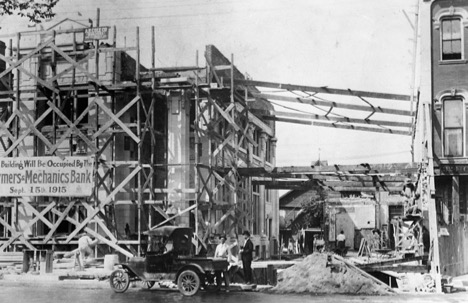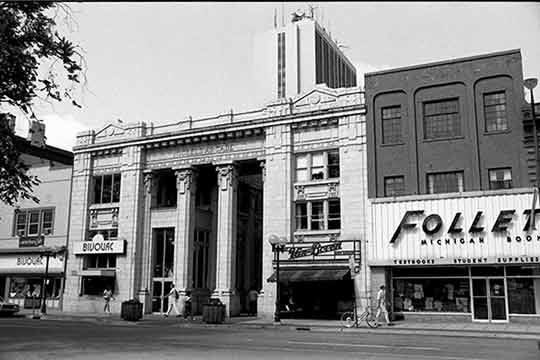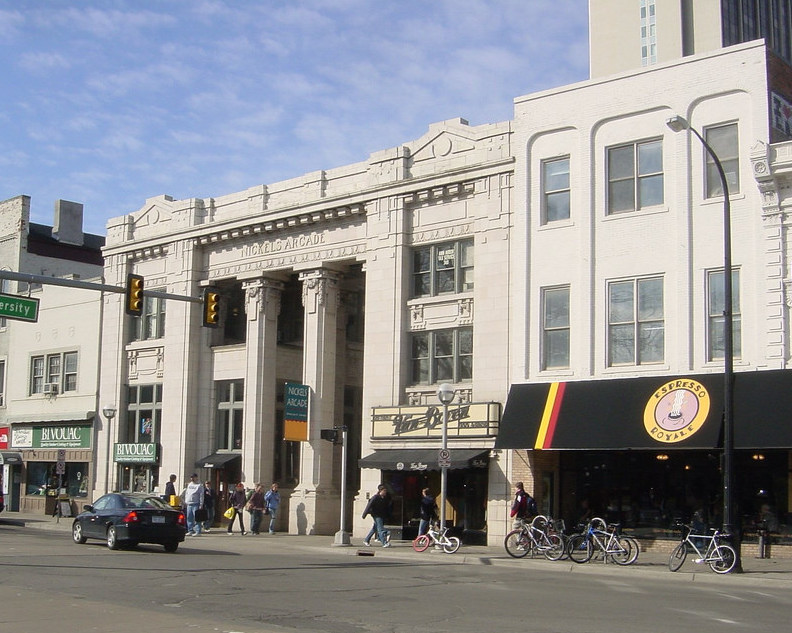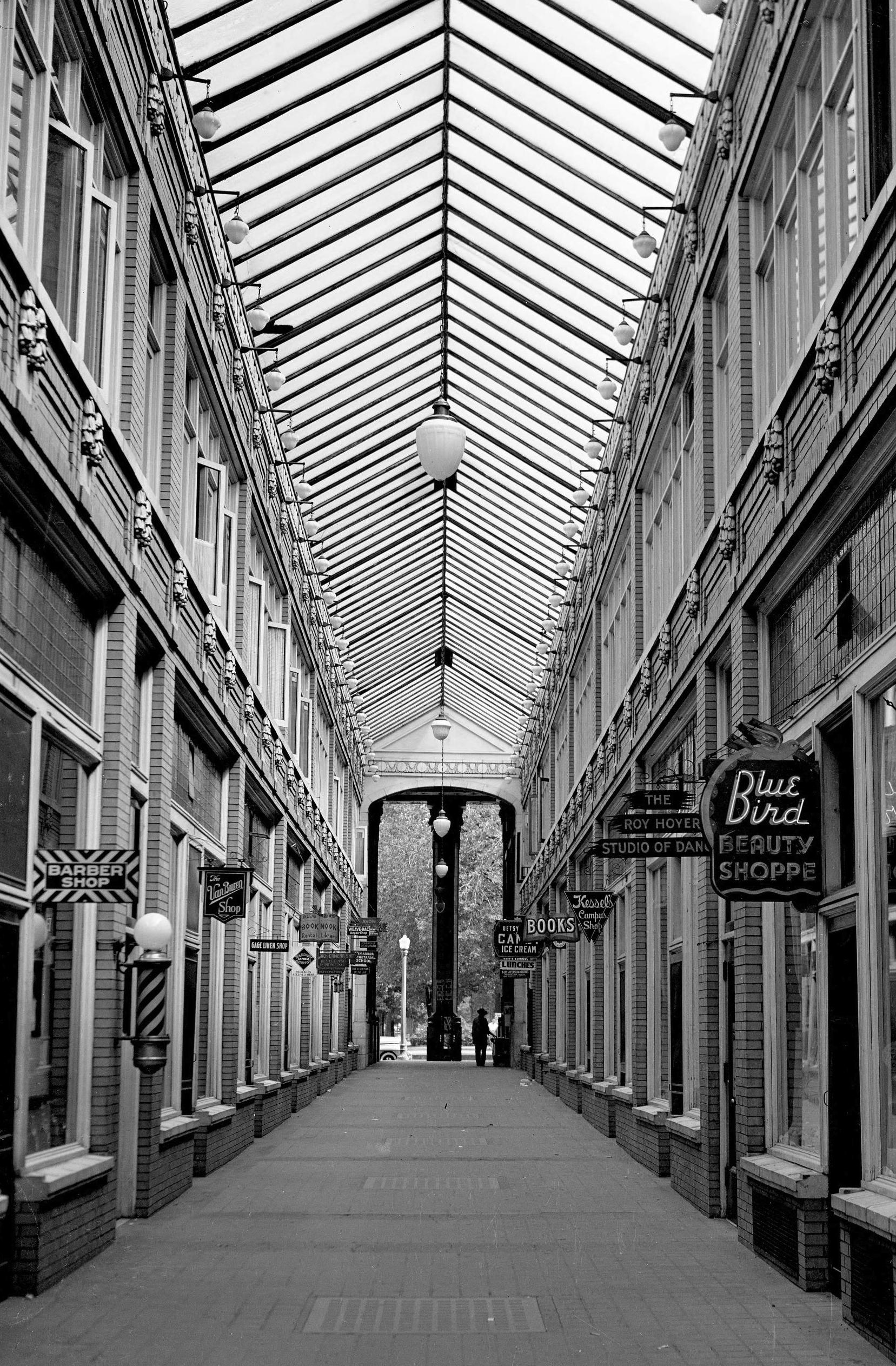Nickels Arcade
An Unofficial Center of Campus Culture and Tradition
J. H. Nickels Meat Market
In 1880, 326 South State Street was a mostly vacant lot, occupied only by a small house (Ruger et al. 1880). In the late 1800s and early 1900s, Ann Arbor’s population was growing as more and more students were enrolling in the University, thus the demand for consumer goods was increasing (“Former Numbers Are Surpassed” 1912). Taking advantage of this trend, John H. Nickels purchased 316 South State Street, among other lots, and demolished the small existing structure. In its place he constructed J. H. Nickels Meat Market, and promised it to his children (“Campus’s Classy Corridor” 2008).

J. H. Nickels Meat Marketin 1872.
One of John’s sons, Tom E. Nickels, was a businessman interested in bringing fine stores to Ann Arbor. Motivated by this interest, Tom bought out his brothers and sister from the meat market, so that he could demolish it to make way for an extravagant business and shopping center (Bergman 2008). It was to be an open arcade with a glass roof for natural light, the likes of which were popular in Europe at the time. The plans were designed by the architect Herman Pipp, who is also known for the Barton Hills Country Club and the Marchese Building (“Nickels Arcade: A Charm Unmatched by Modern Malls” 1979).

The beginnings of Nickels Arcade.
From Market to Marketplace
Farmers and Mechanics Bank was the first signed tenant when construction on Nickels Arcade began in 1915. Unlike later tenants that would occupy the space, the bank owned its portion of the arcade (“Downtown Bank Will Build Branch State Street Office” 1915). By the fall of 1915, the bank’s portion of the arcade as well as the State Street façade was finished and officially opened to the public. More than 3,500 people gathered for the event, including students and townspeople (“Bank Formally Opens First Unit of New Arcade” 1915). The Michigan Daily reports that:
Construction moved slower after the bank and façade were revealed, following the trend of buildings everywhere during World War I (“Nickels Arcade: A Charm Unmatched by Modern Malls” 1979). The construction finally ended in 1918 when the Maynard façade was finished. Nickels Arcade was built in the popular Beaux-Arts style, and measured 265 feet long, with a massive mosaic tiled corridor spanning 261 feet (“Campus’s Classy Corridor” 2008). Shortly after opening, Nickels Arcade started to become an important piece of campus culture.
A Center of Campus Charity
Mrs. Dora Sears Herbert, daughter of Tom E. Nickels recalls the Red Cross as being one of the long-term tenants of the building. Though the Red Cross is not located at Nickels Arcade anymore, it remained there for a large part of the 20th century (“Nickels Arcade: A Charm Unmatched by Modern Malls” 1979). Student volunteers would host donation drives at the entrance of Nickels Arcade so that they could catch students on their way to class (“Drive is Made for Members by Red Cross” 1938).
Another charity that used Nickels Arcade as its venue was Campus Chest, a community outreach charity. Campus Chest would collect money for people in the Ann Arbor area that needed coats and other necessities (“Michigan Ensian” 1958, 34). One of their most popular fundraisers was the Bucket Drive at the arcade, in which women of the University could purchase late permissions for a dollar (“Campus Chest Drive Continues” 1957). The women’s residences on campus used to have a curfew and ladies had to be back to their residence hall by a set time each night (“University Regulations Concerning Student Conduct” 1962, 8). The late permission allowed them to stay out past curfew.

The State Street Facade of Nickels Arcade in 1942
Valentines Then and Now
Throughout the 1960’s and 1970’s, it was customary for male students to purchase a monogrammed circle pin for their Valentine from Bays’ Arcade Jewelry Shop (“A Campus Tradition” 1968). Men would purchase the pins weeks in advance, so that it could be engraved in time. Aside from Monogrammed pins, flowers were, and have always been, a traditional Valentine’s gift. The week before Valentine’s Day, the University Flower Shop pre-makes hundreds of bouquets and fills the arcade corridor outside their shop with them (“Preparing for V-Day” 2008). For years, the shop has started taking orders months in advance, and they always sell out of roses (“Romance: 50 Bucks a Dozen” 1980).


A Hairy Tradition

On the left is the old barber shop in 1930.
On any given day, Arcade Barbers in Nickels Arcade is bustling with people getting their haircut. The shop has changed owners many times throughout the years, but it is the only shop in the arcade that has kept its original vision (“Nickels Arcade: A Charm Unmatched by Modern Malls” 1979). The tradition of Michigan students getting a nice haircut for the interview season at the arcade is one that still exists today (“Shaved and Shorn” 1976). In January and February, the line outside Arcade Barbers is sizable as recruiters ascend on campus.
In 1987, Nickels Arcade became a registered historical landmark because of its importance to both Ann Arbor and the University of Michigan (“National Register of Historic Places”). Today, Nickels Arcade is still a popular social space for students. Next time you walk through Nickels Arcade, think of all of the Michigan traditions that have taken place there. As you make your way down the corridor, you will see people studying at one of the coffee shops, or meeting with friends between classes.

The State Street Facade of Nickels Arcade in 1942
Sources
-
“A Campus Tradition.” Michigan Daily Digital Archives, February 4, 1968.
-
“Bank Formally Opens First Unit of New Arcade.” Michigan Daily Digital Archives, October 21, 1915.
-
“Campus Chest Drive Continues.” Michigan Daily Digital Archives, May 10, 1957.
-
“Campus’s Classy Corridor.” Michigan Daily Digital Archives, October 15, 2008.
-
“Downtown Bank Will Build Branch State Street Office.” Michigan Daily Digital Archives, March 6, 1915.
-
“Drive Is Made for Members by Red Cross.” Michigan Daily Digital Archives, November 13, 1938.
-
“Former Numbers Are Surpassed.” Michigan Daily Digital Archives, July 6, 1912.
-
Michigan Ensian. UM Libraries, 1958.
-
“National Register of Historic Places Database and Research Page.” National Register of Historic Places.
-
“Nickels Arcade: A Charm Unmatched By Modern Mall Old News.” Ann Arbor News, July 28, 1974. -
“Preparing for V-Day.” Michigan Daily Digital Archives, February 12, 2008.
-
“Romance: 50 Bucks a Dozen.” Michigan Daily Digital Archives, February 14, 1980.
-
Ruger, A., J. J. Stoner, Beck, and Pauli. “Panoramic View of the City of Ann Arbor, Washtenaw Co., Michigan 1880.” Washington, D.C.: Library of Congress, 1998.
-
“Shaved and Shorn.” Michigan Daily Digital Archives, January 22, 1976.
- University of Michigan. University Regulations Concerning Student Conduct. University of Michigan Official Publication, 1962.